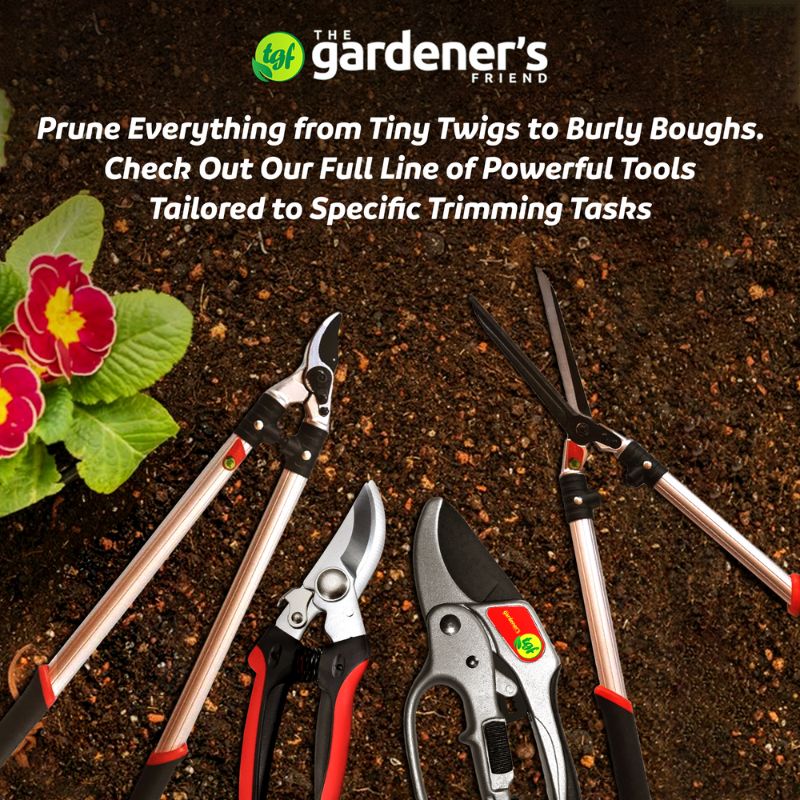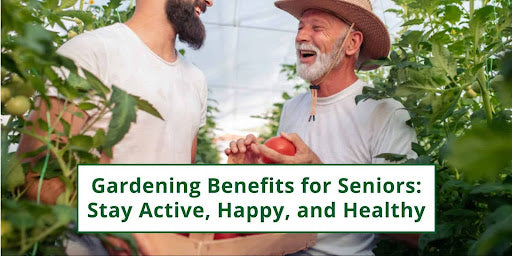Gardening is more than just planting flowers, vegetables, and fruits, and pulling weeds. It’s a hobby that combines physical activity, mental stimulation, and emotional fulfillment.
It’s also one of the few pastimes that can be tailored to any ability level, which makes it a perfect choice for elderly gardeners.
In this blog post, we’ll delve into the reasons why gardening is great for seniors. You’ll learn different benefits you can get if you’re a senior, have limited hand mobility, or are suffering from joint issues, such as arthritis.
What Physical Benefits Does Gardening Offer Seniors?
As we age, staying active may become challenging, but it’s also important to maintain or improve our overall health.
Gardening is a perfect low-impact exercise for seniors; you don’t have to overexert and can adjust your effort based on your capacity.
Here are the physical benefits you get out of it:
- Improves Mobility and Flexibility: Gardening tasks that require stretching and bending keep your joints moving and muscles flexible. The motion can help reduce stiffness, especially in arthritis patients
- Reduces Joint Pain: If you’re already experiencing joint pain, gardening can ease inflammation and strengthen muscles around joints
- Builds Strength and Balance: Some activities, like carrying small pots, digging, and pulling weeds, are like light resistance training for your body. They can support muscle health and balance
- Encourages Regular Exercise: If you can’t go to the gym or don’t have the energy for regular exercise, gardening can be a perfect alternative
How Does Gardening Support Mental And Emotional Health?
The mental health benefits of gardening are just as powerful as the physical ones. The activity has been shown to decrease the stress hormone, lifting your mood.
- Reduces Stress and Anxiety: Being in nature creates a calming effect that lowers tension
- Improves Focus and Memory: Gardening can keep your memory and focus sharp, as it requires planning and attention to detail
- Lowers Risk of Depression: Multiple studies have linked regular gardening to improved mood and reduced symptoms of depression in older adults
- Boosts Emotional Well-being: Watching a seed grow into a flower or vegetable gives a sense of accomplishment, which can be deeply rewarding
What Social Benefits Can Seniors Gain From Gardening?
Of course, gardening doesn’t have to be a solitary activity. It can be a great opportunity for seniors to stay socially connected.
- Creates Opportunities for Interaction: You can chat with neighbors while watering, join a gardening club, or get your friends to come over
- Community Gardens: You can join a shared garden space in your town, meet new people, and learn more about gardening
How Does Gardening Encourage Healthy Eating For Seniors?
The final harvest is probably the biggest reward for any gardener. Growing your own fruits, vegetables, and herbs not only saves money but also encourages healthier eating habits.
- Better Nutrition: You’re more likely to eat fresh fruits and vegetables when you grow them yourself
- Promotes Independence: Growing your own produce gives you control over what you eat, which is empowering
- Accessibility: You don’t have to do frequent store trips to be able to make something at home. The main ingredients are always available from your backyard
What Cognitive Benefits Come From Gardening?
Gardening can also be a great brain workout. First, it stimulates problem-solving; you decide where to plant, how to deal with pests, or when to water. All that requires some degree of critical thinking.
In addition to that, remembering when to prune or fertilize engages your memory skills. And studies suggest that mentally engaging activities like gardening may reduce the risk of health conditions like dementia and Alzheimer’s.
How Does Gardening Improve the Quality Of Life For Seniors?
Regular gardening adds rhythm and meaning to your day-to-day life. First of all, you’re connecting with nature, soaking up sunlight, and breathing fresh air, which can boost your overall well-being.
Second, it provides a sense of purpose. It gives you a solid reason to get outside every day. Plus, regular activity combined with natural sunlight exposure can help regulate sleep cycles.
What Are The Best Gardening Approaches For Seniors?
Gardening should be enjoyable, not exhausting, especially for seniors or anyone with mobility issues. You just need to adapt your approach and techniques based on your bodily needs.
Start with low-maintenance tasks. Go with plants that don’t require constant attention, such as perennials or herbs.
In addition, use raised beds and containers to bring the plants closer to your waist; by doing that, you won’t have to bend or kneel as often.
Related Read: How to Garden with Bad Knees?
Plus, use padded, lightweight, and long-handled tools to reduce strain on your joints. You also don’t have to work constantly; take short breaks to give your body enough rest.
Frequently Asked Questions
Is Gardening Safe For All Seniors?
Yes, but it’s crucial to understand your body first. Gardeners with arthritis, a heart condition, and even mobility challenges should consult a doctor and make adjustments to their gardening routine.
How Much Time Should Older Adults Spend Gardening?
There’s no ideal timeframe, but generally, 20 - 30 minutes of activity followed by a break is a good habit. Listen to your body and take rest as soon as you feel pain or fatigue.
What Are The Easiest Plants For Seniors To Grow?
Low-maintenance plants like lettuce, tomatoes, basil, lavender, and marigolds are some good choices. They tend to grow quickly and require minimal upkeep.
Does Gardening Really Count As Exercise?
Yes. Gardening involves stretching, lifting, bending, and walking. All of these qualify as light to moderate physical activity. If you do it right, you can get the benefits of the gym without having to go to one.
Conclusion
Despite what many people might think, gardening isn’t just a pastime, especially for seniors. It’s a full-body experience that:
- Supports physical health
- Boosts mental well-being
- Encourages better nutrition
It can also sharpen the mind and bring a sense of purpose to your life. Since it often involves brain activity as well, gardening can also sharpen the memory and cognitive function.
Browse Our Gardening Tools Collection for the Elderly


